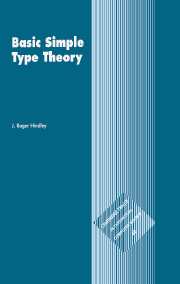Book contents
- Frontmatter
- Contents
- Introduction
- 1 The type-free λ-calculus
- 2 Assigning types to terms
- 3 The principal-type algorithm
- 4 Type assignment with equality
- 5 A version using typed terms
- 6 The correspondence with implication
- 7 The converse principal-type algorithm
- 8 Counting a type's inhabitants
- 9 Technical details
- Answers to starred exercises
- Bibliography
- Table of principal types
- Index
6 - The correspondence with implication
Published online by Cambridge University Press: 02 December 2009
- Frontmatter
- Contents
- Introduction
- 1 The type-free λ-calculus
- 2 Assigning types to terms
- 3 The principal-type algorithm
- 4 Type assignment with equality
- 5 A version using typed terms
- 6 The correspondence with implication
- 7 The converse principal-type algorithm
- 8 Counting a type's inhabitants
- 9 Technical details
- Answers to starred exercises
- Bibliography
- Table of principal types
- Index
Summary
One of the most interesting facts about TAλ is that there is a very close correspondence between this system and propositional logic, in which the types assignable to closed terms in TAλ turn out to be exactly the formulae provable in a certain formal logic of implication. This correspondence is often called the Curry-Howard isomorphism or the formulae-as-types isomorphism, and will be studied in this chapter.
The logic involved in this correspondence is not the classical logic of truth-tables however, but that of the intuitionist philosophers; it will be defined in the first section below.
The Curry-Howard isomorphism was first hinted at in print in Curry 1934 p.588, and was made explicit in Curry 1942 p.60 footnote 28 and Curry and Feys 1958 §9E. But it was viewed there as no more than a curiosity. The first people to see that it could be extended to other connectives and quantifiers and used as a technical tool to derive results were N. G. de Bruijn, William Howard and H. Läuchli in the 1960's. See Howard 1969, de Bruijn 1980 (an introduction to de Bruijn's AUTOMATH project which began in the 1960's), and Läuchli 1965.
This chapter will also define three rather interesting subsystems of intuitionist logic and show that they correspond to the three restricted classes of λ-terms defined in Section ID. This correspondence was first noted by Carew Meredith in unpublished work around 1951 and was explored in detail in the thesis Rezus 1981.
- Type
- Chapter
- Information
- Basic Simple Type Theory , pp. 74 - 92Publisher: Cambridge University PressPrint publication year: 1997



